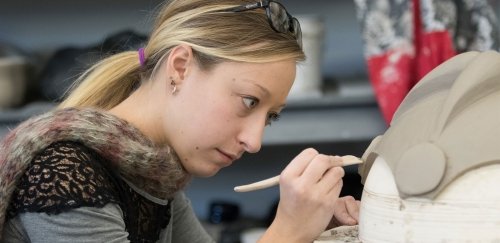Performance of students in initial teacher preparation programs is measured through outcomes that are aligned with the four themes of the FSEHD Conceptual Framework and the Rhode Island Professional Teacher Standards:
General Education
Reflective practitioners possess a broad base of knowledge in the liberal arts, including mastery of oral and written English communication, mathematical and reasoning skills, and technological competence as well as a global perspective that emphasizes people's interdependence with one another and with nature.
Human Learning and Development
Reflective practitioners have a solid grounding in educational psychology, the branch of psychology that specializes in understanding teaching and learning in educational settings. They know the four pillars of educational psychology: human development, theories of learning and cognition, classroom management, and assessment.
Contexts of Schooling
Reflective practitioners possess a critical understanding of the contexts of schooling: social, political, economic, historical, philosophical, legal, professional, global, and cultural.
Area of Specialization
Reflective practitioners possess a deep, thorough, and, above all, working knowledge of their area(s) of specialization, enabling them to make informed decisions to approach curriculum implementation.
Theory and Practice of Teaching and Learning
Reflective practitioners employ a variety of models of teaching and learning. Best practice entails a balance between pedagogical approaches.
Instructional Uses of Technology
Reflective practitioners integrate technology into curricula, instruction, and assessment of students to create high-quality learning experiences and instructional opportunities.
Assessment as an Aid to Practice
Assessment is primarily a means for determining the relative success of teaching and counseling interventions for the purpose of improving them in the future. In other words, assessment is used as a tool for reflection and subsequent planning.
Cultural Diversity and Multicultural Education
Reflective educators are knowledgeable of both the differences that distinguish individuals and groups and the commonalities that bind them together. They understand and respond to the diverse needs and backgrounds of students, clients, and families and develop strategies for combating prejudice and advancing educational equity, inclusion, and intercultural understanding.
Special Needs and Inclusion
Reflective practitioners are aware of the impact of disability on the teaching-learning process and are responsive to the individual strengths and needs of children and youth with a range of disabilities. They understand the effect that disability has on family functioning, and they can work effectively with parents in program planning. In order to function effectively in an inclusive environment, reflective practitioners must also collaborate with professionals from all disciplines when making educational decisions. They examine their own cultural and family background as it pertains to disability, reflecting on the impact of their beliefs and behavior on the classroom setting, counseling situation, or planning session, making adjustments as necessary. They are prepared not only to be responsive to students' adapted curriculum, instruction, and learning needs but also to make curriculum adaptations and instructional modifications on-the-spot to accommodate students' needs.
Professional Ethics
Ethics are principles of conduct used to guide an individual's behavior. Ethical principles guide practitioners as they determine aims and objectives; select content and materials; plan and implement methods and strategies; conduct non-discriminatory evaluations of students, clients, and staff; reflect on their choices and actions; and take responsibility for the consequences. Reflective practitioners accept the professional, social, ethical, and moral responsibilities and reap the personal rewards of being a teacher in a democratic, pluralistic society.
Collaboration and Advocacy
Reflective practitioners recognize that schools, families and communities must work together, and educators must collaborate within schools, to support student and client learning and growth, and to promote democratic values in their own communities and beyond.
Professional Development
Reflective practitioners consciously plan, implement, and reflect upon their own professional growth, as well as that of the profession. Committed professionals actively participate in a wide variety of educational opportunities.
The Rhode Island Professional Teaching Standards
- Teachers create learning experiences using a broad base of general knowledge that reflects an understanding of the nature of the communities and world in which we live.
- Teachers have a deep content knowledge base sufficient to create learning experiences that reflect an understanding of central concepts, vocabulary, structures, and tools of inquiry of the disciplines/content areas they teach.
- Teachers create instructional opportunities that reflect an understanding of how children learn and develop.
- Teachers create instructional opportunities that reflect a respect for the diversity of learners and an understanding of how students differ in their approaches to learning.
- Teachers create instructional opportunities to encourage all students' development of critical thinking, problem solving, performance skills, and literacy across content areas.
- Teachers create a supportive learning environment that encourages appropriate standards of behavior, positive social interaction, active engagement in learning, and self-motivation.
- Teachers work collaboratively with all school personnel, families and the broader community to create a professional learning community and environment that supports the improvement of teaching, learning and student achievement.
- Teachers use effective communication as the vehicle through which students explore, conjecture, discuss, and investigate new ideas.
- Teachers use appropriate formal and informal assessment strategies with individuals and groups of students to determine the impact of instruction on learning, to provide feedback, and to plan future instruction.
- Teachers reflect on their practice and assume responsibility for their own professional development by actively seeking and participating in opportunities to learn and grow as professionals.
- Teachers maintain professional standards guided by legal and ethical principles.


